Overview
This article highlights the crucial role of early autism screening for two-year-olds, particularly focusing on the 2-year-old autism test's significance in identifying Autism Spectrum Disorder (ASD) for timely intervention. Early detection is vital; tools like the M-CHAT-R not only facilitate this process but also lead to improved developmental outcomes. Children who receive early support often exhibit significant advancements in communication and social skills, which can be a source of hope for many families navigating these challenges.
As a parent, you might feel overwhelmed by the prospect of autism screening. It's completely natural to have concerns about your child's development. Remember, early intervention can make a world of difference. Imagine your child blossoming in their communication abilities, engaging more with peers, and thriving in social settings. These are not just possibilities; they are realities for many children who receive early support.
If you’re considering autism screening for your child, know that you are not alone. Many parents share similar experiences and emotions. Engaging with your pediatrician about the screening process can provide clarity and reassurance. Together, we can foster a nurturing environment that prioritizes your child's developmental needs. Let’s take this step towards understanding and supporting our children better.
Introduction
In a world where early detection can profoundly influence a child's developmental journey, understanding the 2-year-old autism test becomes essential for parents. This crucial assessment not only identifies Autism Spectrum Disorder at a young age but also paves the way for vital interventions that can improve communication and social skills. Yet, with an overwhelming amount of information available, how can parents navigate the complexities of autism testing and ensure their child receives the best possible support? This article explores key insights that empower parents to take proactive steps in their child's autism journey.
About ASD Media: Empowering Parents with Autism Resources
At ASD Media, we are dedicated to advancing the implementation of Applied Behavior Analysis (ABA) therapy by providing valuable insights and strategies that tackle common challenges faced by families. Our organization offers a diverse array of resources designed specifically for both parents and specialists in the field of developmental disorders. Central to our mission is the creation of a supportive and inclusive community where individuals can share their experiences, learn from one another, and receive essential support throughout their journeys.
By signing up for our newsletter, families can access the latest news and a wealth of digital resources, empowering them to unlock the potential of children with developmental disorders and ADHD. We focus on equipping families with effective strategies for managing difficult behaviors, navigating intricate support services, and enhancing social skills development. Our ultimate goal is to promote a collaborative environment that benefits everyone involved in the community.
As highlighted by the CDC, the 2 year old autism test can help identify Autism Spectrum Disorder as early as 18 months, which underscores the importance of early support and the availability of resources. Additionally, our Autism Parent Navigators program exemplifies our commitment to helping families navigate care and access vital resources. This initiative reinforces our role in advocating for improved Medicaid coverage for ABA therapy, ensuring that families receive the support they need.
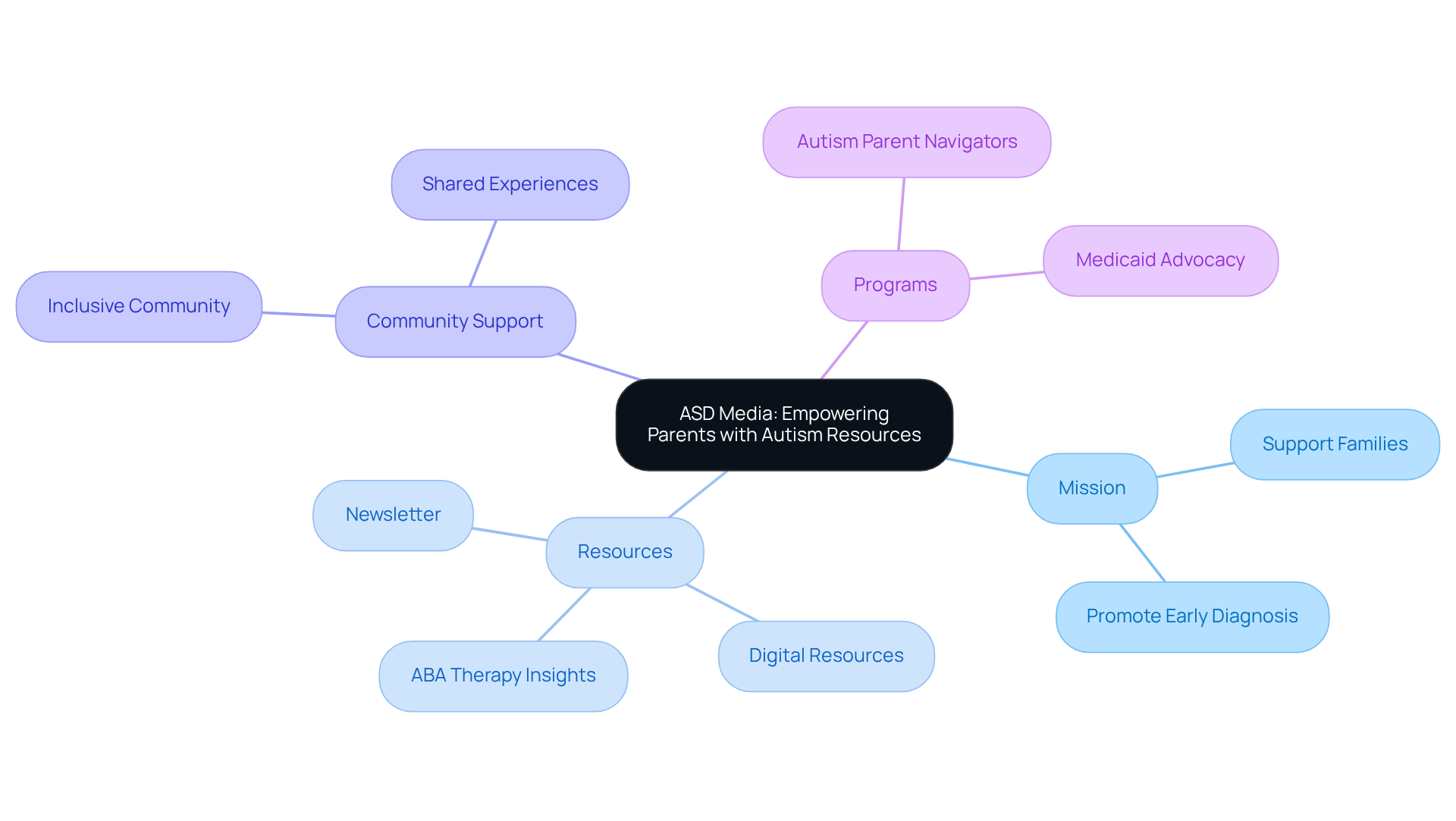
Importance of Early Autism Screening for 2-Year-Olds
Early screening for developmental disorders is not just important; it’s essential for nurturing our children’s growth. Detecting developmental delays and behavioral issues at a young age allows for timely support. Research indicates that children who undergo the 2 year old autism test and are diagnosed with autism can significantly benefit from early intervention strategies. These strategies can lead to improvements in communication, social skills, and overall development.
During well-visit appointments, pediatricians typically conduct evaluations using tools like the M-CHAT-R. This instrument features a series of questions that delve into your child's behavior, providing a clearer picture of their developmental status. Early identification is key; it opens the door to vital resources and support that can enhance your child's quality of life.
As parents, it’s natural to feel concerned about your child’s development. Remember, you are not alone in this journey. By staying informed and proactive, you can take the necessary steps to ensure your child receives the support they need. Let’s work together to foster a brighter future for our little ones.
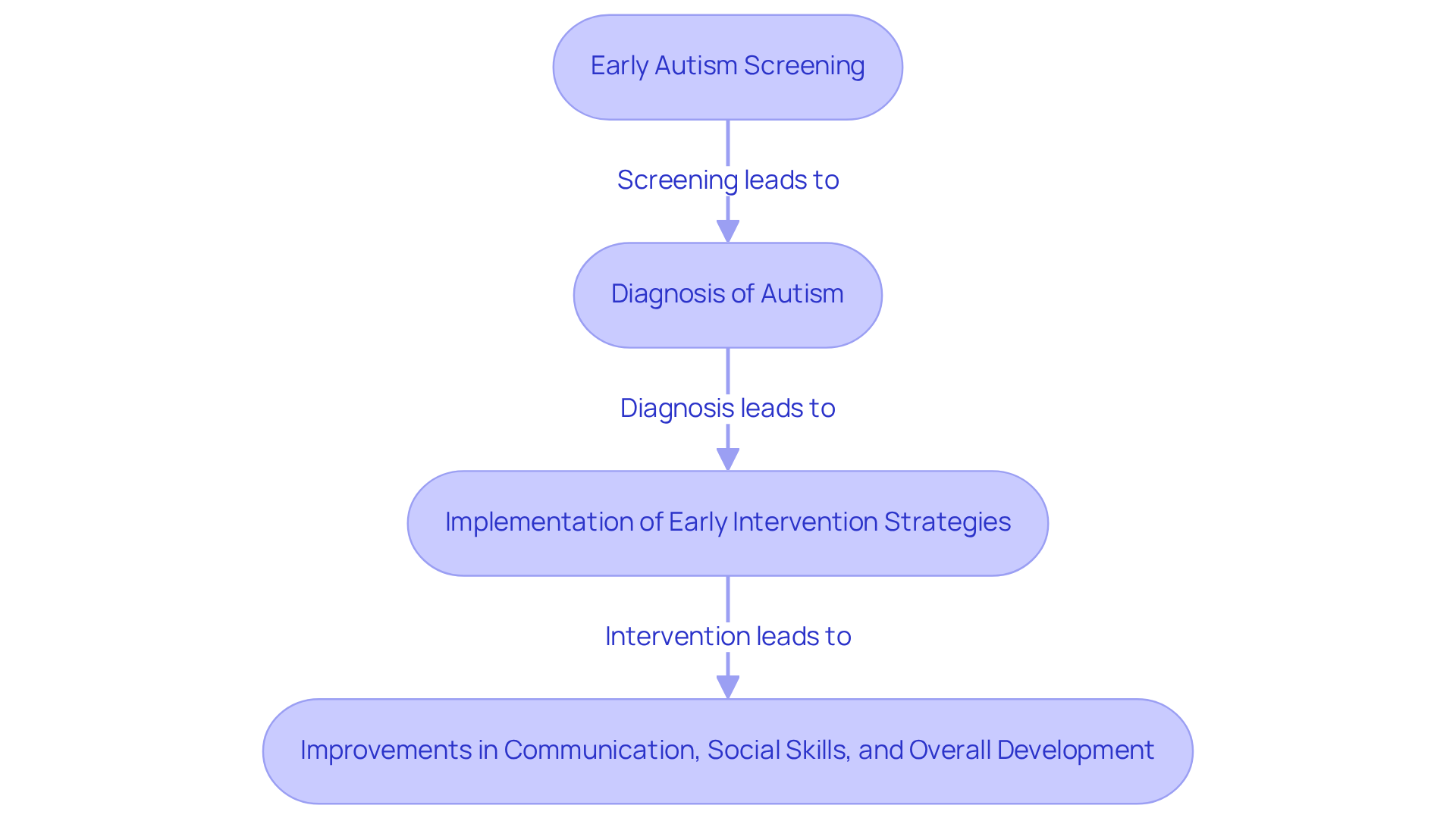
Common Autism Tests for 2-Year-Olds: What Parents Should Know
Navigating the world of developmental assessments for your child can feel overwhelming, but understanding the 2 year old autism test and the tools available can make a significant difference. Common assessments include:
- The Modified Checklist for Developmental Disorders in Toddlers, Revised (M-CHAT-R)
- The Screening Tool for Developmental Disorders in Two-Year-Olds (STAT)
- The 2 year old autism test
The M-CHAT-R is a parent-completed questionnaire designed to identify behaviors that may suggest a developmental disorder, while the STAT engages toddlers through interactive activities that evaluate communication and social skills.
Recent updates in 2025 have refined the M-CHAT-R, enhancing its effectiveness and ensuring it remains a reliable tool for early detection. Research shows that the STAT is particularly effective in engaging toddlers through play-based assessments, making it a valuable complement to the 2 year old autism test and the M-CHAT-R. Understanding these tests is crucial for parents, as early screening can significantly impact intervention outcomes. As the American Academy of Pediatrics notes, the 2 year old autism test has made early detection of developmental conditions four times more probable than it was twenty years ago, underscoring the importance of these tools.
Parents are encouraged to share their experiences with these assessments. Anecdotal evidence can provide valuable insights into the testing process and its implications for your child’s development. For instance, Dr. Gray Atherton emphasizes that timely diagnosis can greatly influence the quality of life for autistic individuals. Statistics indicate that early recognition through instruments like the M-CHAT-R and STAT can lead to prompt interventions, enhancing long-term outcomes for children on the spectrum.
To foster open conversations about developmental assessments, feel empowered to approach your pediatrician with any inquiries or concerns. This dialogue ensures you have the essential support and resources needed for your child's developmental journey.
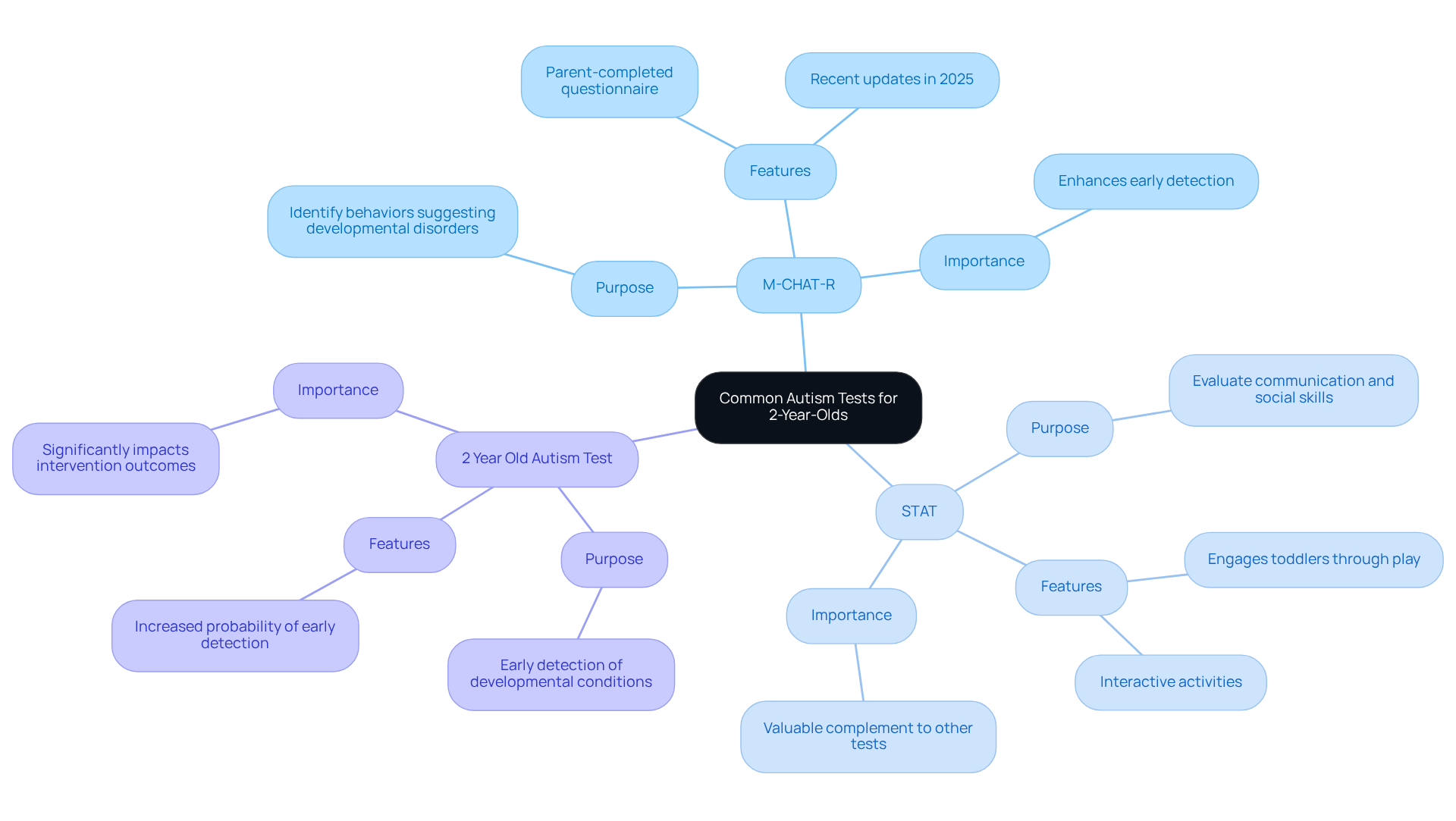
Key Signs of Autism in 2-Year-Olds: A Parent's Guide
As parents, recognizing the key signs of developmental conditions in your 2-year-old can be both daunting and crucial, especially when considering a 2 year old autism test. Look for:
- Limited eye contact
- Delayed speech development
- Lack of interest in social interactions
- Repetitive behaviors
These signs can be subtle yet significant. Additionally, be attentive to:
- Difficulty in understanding social cues
- Limited use of gestures
- Unusual reactions to sensory experiences
By being aware of these indicators, you empower yourself to seek evaluations like a 2 year old autism test and support sooner. This proactive approach is vital for effective intervention, ensuring your child receives the help they need to thrive.
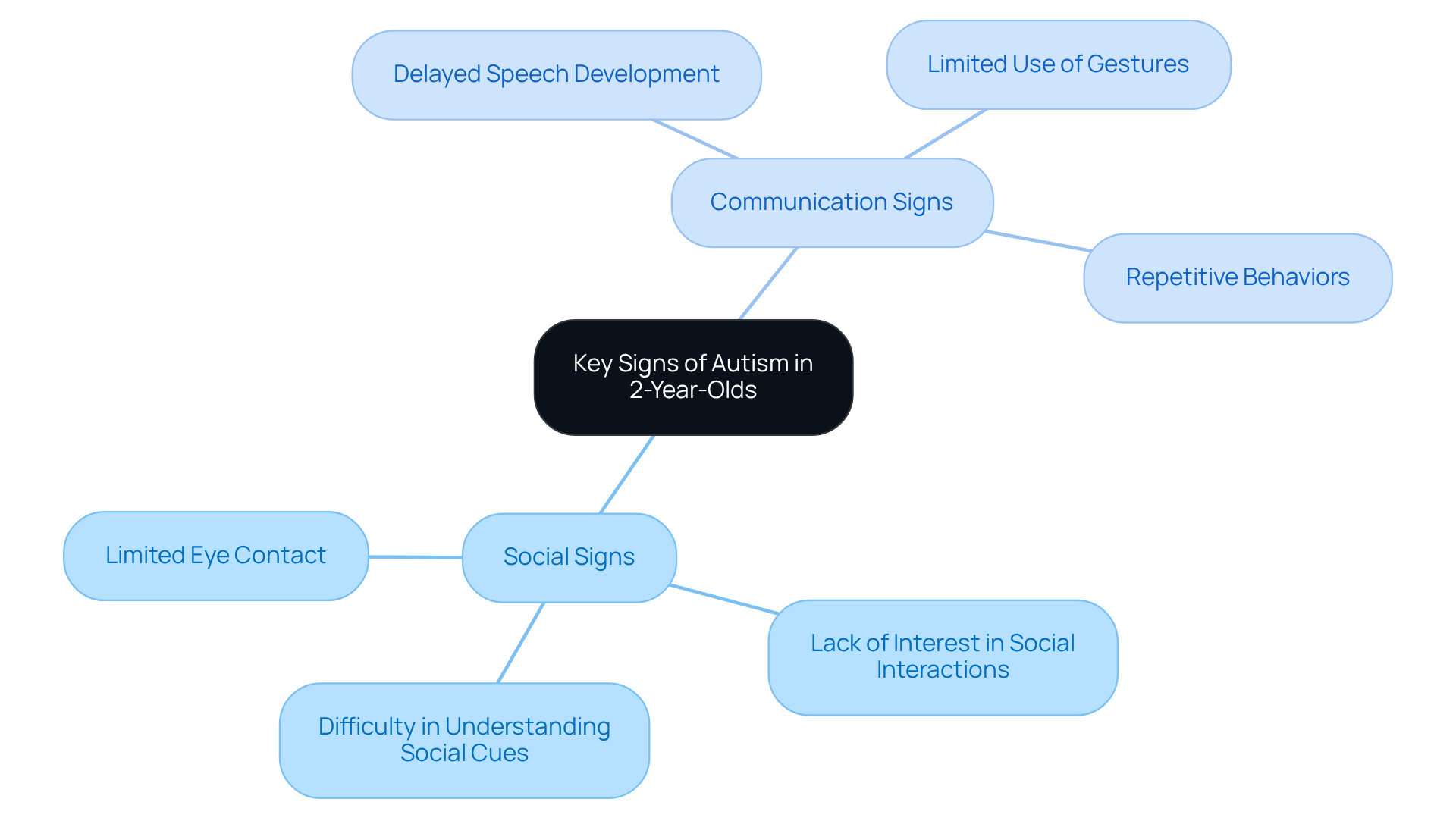
Role of Healthcare Professionals in Autism Testing
Healthcare professionals, especially pediatricians, are pivotal in the journey of autism testing. They conduct initial screenings during routine check-ups, ensuring that families receive the attention they need. When necessary, pediatricians refer families to specialists for comprehensive evaluations, fostering a sense of support and guidance.
Utilizing standardized tools like the M-CHAT-R, they engage in meaningful conversations with caregivers, addressing their observations and concerns. This collaborative approach is essential in ensuring that children receive timely evaluations and the appropriate support they deserve. Together, we can navigate this path with compassion and understanding.
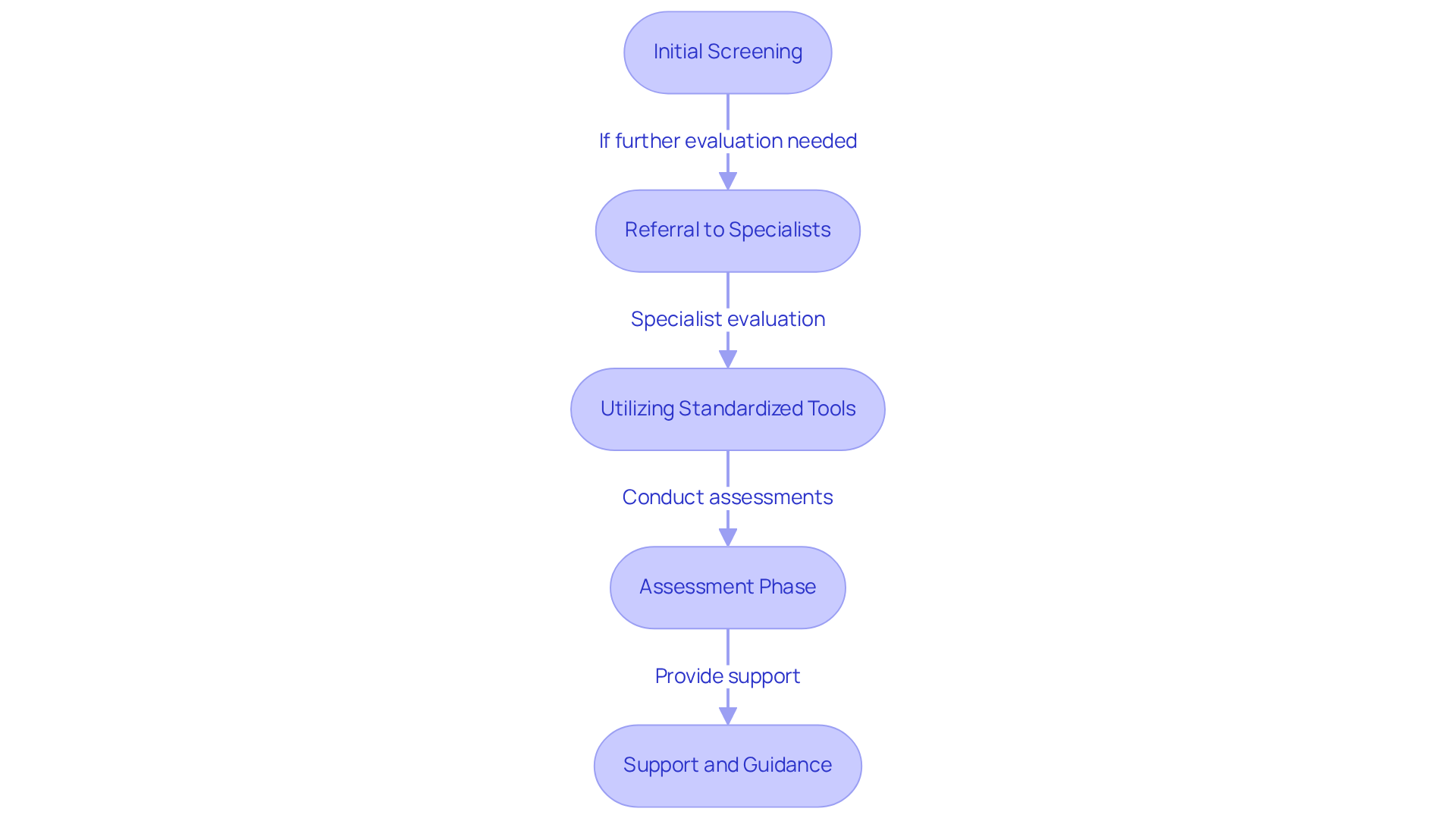
Understanding Autism Test Results: Next Steps for Parents
Upon receiving the test results, it’s crucial for guardians to fully grasp the implications of these findings. If a diagnosis is confirmed, having an open and thorough discussion with healthcare providers about the recommended next steps becomes vital. This may involve:
- Exploring various therapy options
- Understanding the educational support available
- Identifying additional resources for further assistance
Statistics reveal that 73.6% of autistic students graduate high school, yet only 40% of high school students living with autism continue on to college. This stark contrast underscores the importance of early intervention and thoughtful educational planning.
Additionally, connecting with support groups and other families facing similar challenges can offer invaluable emotional support and practical guidance. Family support groups and forums provide not only resources but also a platform to share experiences. Many caregivers find comfort and direction through these shared journeys, which can significantly ease the path ahead. Effective next steps might include enrolling in Applied Behavior Analysis (ABA) therapy, recognized as one of the most effective treatments for developmental disorders. Remarkably, 93.9% of caregivers report visible benefits from ABA therapy, while 36.5% of caregivers for individuals with developmental disorders utilize it, highlighting its prevalence and acceptance among guardians.
By taking these proactive steps, guardians can better navigate the complexities of autism and foster a nurturing environment for their children. Remember, you are not alone on this journey; sharing your experiences can create a supportive community that uplifts everyone involved.
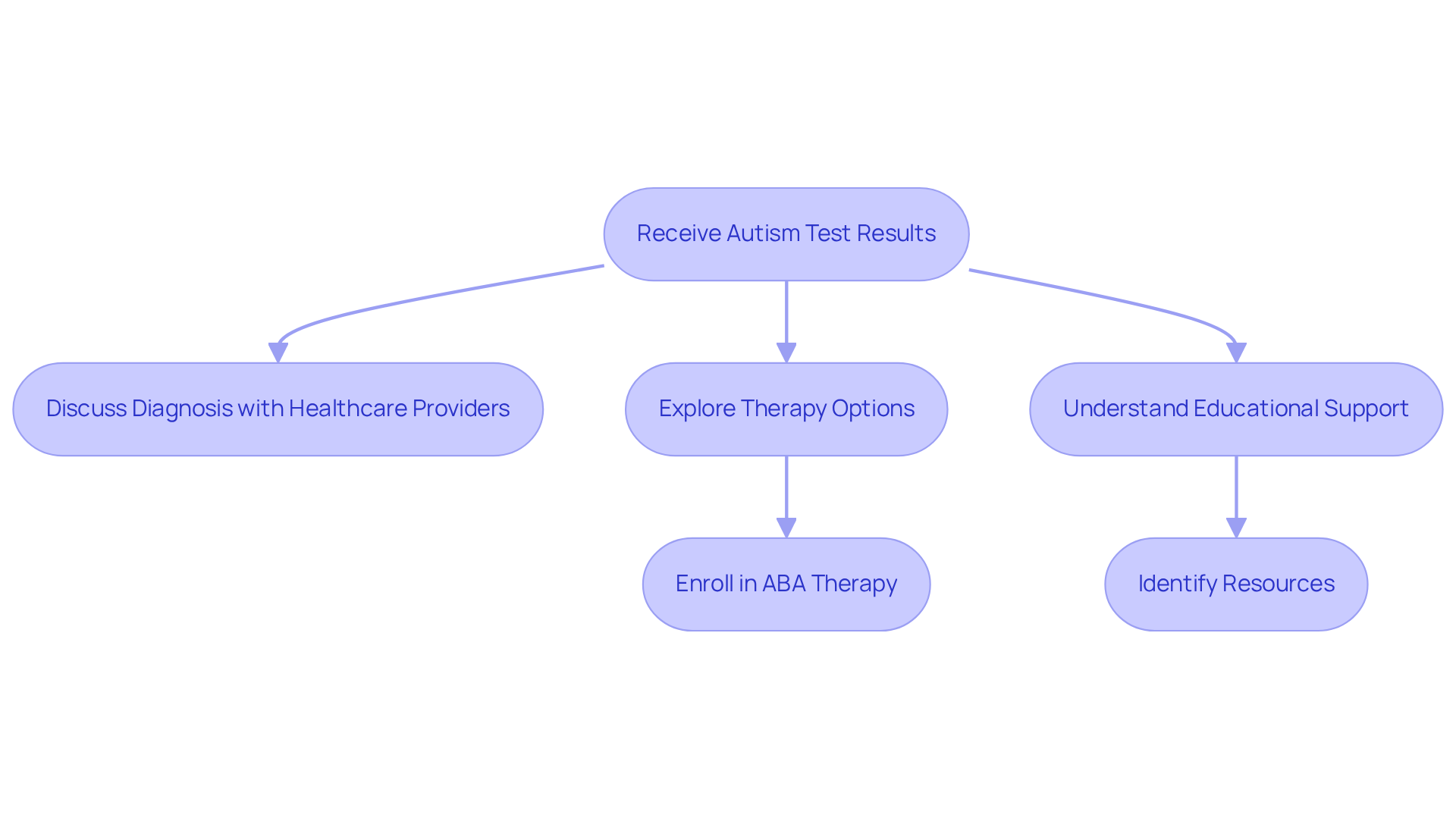
Ongoing Assessments: Supporting Your Child's Development
Continuous evaluations play a vital role in tracking a young person's development and the success of interventions. By conducting frequent assessments, guardians and professionals can recognize both the progress made and the areas that may require additional support. These evaluations can take many forms, including formal testing, observational assessments, and insightful feedback from educators and therapists. When parents actively participate in the evaluation process, they can advocate for their child's needs, ensuring that they receive the most suitable and effective support throughout their developmental journey.
Did you know that studies indicate 70.5% of youngsters with developmental disorders receive some type of intervention? Those who benefit from regular oversight are more likely to achieve significant developmental milestones, highlighting the importance of these assessments in fostering positive outcomes. Family involvement is crucial for successful therapy results, as it empowers therapists to understand the individual's unique needs and enhances the effectiveness of the treatment plan. Parents are encouraged to maintain open lines of communication with therapists about their child's progress, ensuring that the support provided is tailored to their specific requirements.
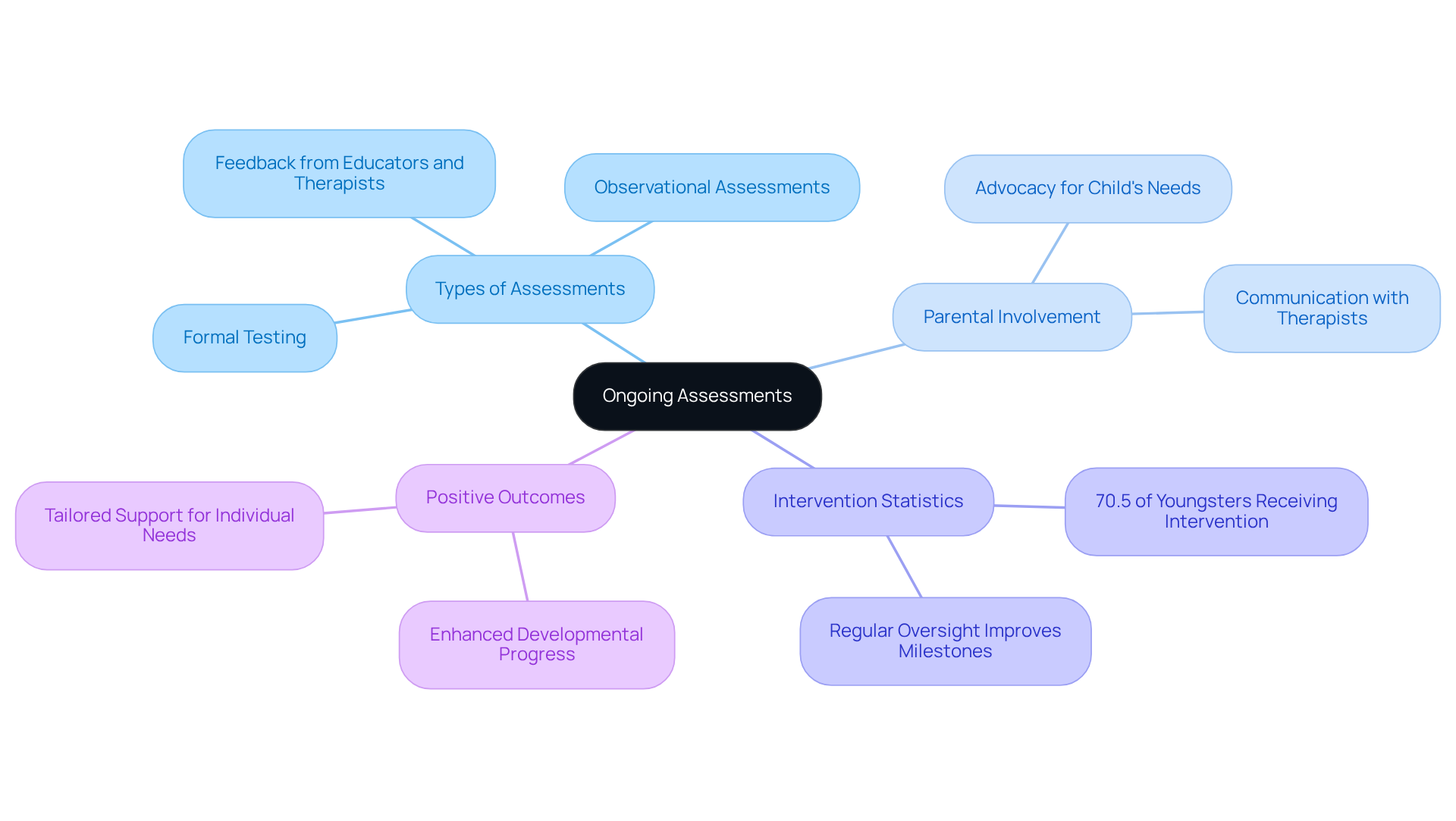
The Importance of Parental Involvement in Autism Evaluations
Engaging parents in the assessment of developmental disorders is crucial for gaining a deep understanding of a young person's behavior and growth. Did you know that 91% of autism professionals believe parental insights significantly enhance the quality of assessments? Parents offer invaluable perspectives that shed light on their child's strengths and challenges, which are essential for evaluators. By actively participating in the evaluation process, guardians can effectively advocate for their child's unique needs, ensuring the assessment accurately reflects their circumstances.
This collaborative approach between parents and professionals is vital for creating effective intervention strategies tailored to each individual's specific requirements. Experts emphasize that parental insights not only enhance the assessment process but also foster a supportive environment that nurtures the young one's growth and development. As Dr. Barry Prizant beautifully states, "The measure of success for me in working with youngsters with autism is to let a young person know that they are understood, and that being heard is a result of mutual empathy rather than heroic effort."
By sharing insights about their child's behavior, caregivers can help evaluators identify key areas for intervention, ultimately leading to a more comprehensive understanding of the child's needs. To prepare for the evaluation, parents should consider documenting specific behaviors, developmental milestones, and any relevant health history to share with evaluators. This preparation not only aids the assessment but also empowers parents in their journey to support their child's development.
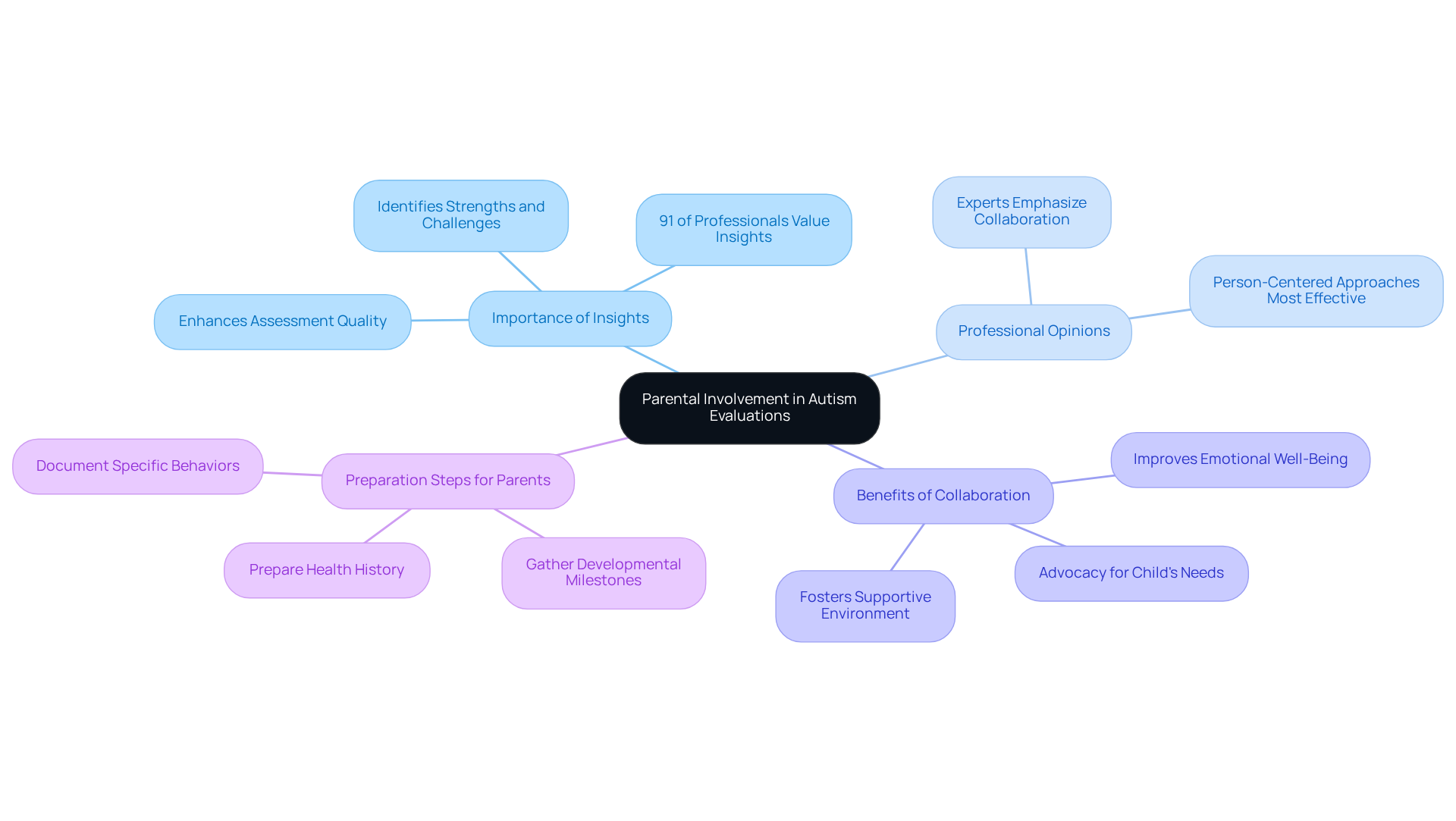
Impact of Early Diagnosis on Long-Term Outcomes for Autism
Research reveals that early detection of autism can significantly enhance long-term outcomes for young individuals. This is particularly important for parents who want the best for their children. Studies show that early support programs can lead to remarkable improvements in communication skills, social interactions, and adaptive behaviors. For instance, children diagnosed before the age of three often achieve developmental milestones more rapidly than those diagnosed later. In fact, 1 in 36 children in the United States receive an autism diagnosis, underscoring the prevalence of this condition and the critical need for early intervention.
Experts like Lonnie Zwaigenbaum emphasize that timely diagnosis and support can profoundly influence developmental trajectories, ultimately improving the quality of life for both children with autism and their families. This underscores the importance of prompt evaluations and the initiation of appropriate therapies to nurture optimal growth and development.
Additionally, quick referral for a diagnostic assessment, such as the 2 year old autism test, following a positive screening is vital, as diminished social attention and communication can be early signs of ASD between 12 and 24 months. However, we must also address the barriers to effective ASD screening in healthcare settings to ensure swift diagnosis and early support. Together, we can make a difference in the lives of these children and their families.
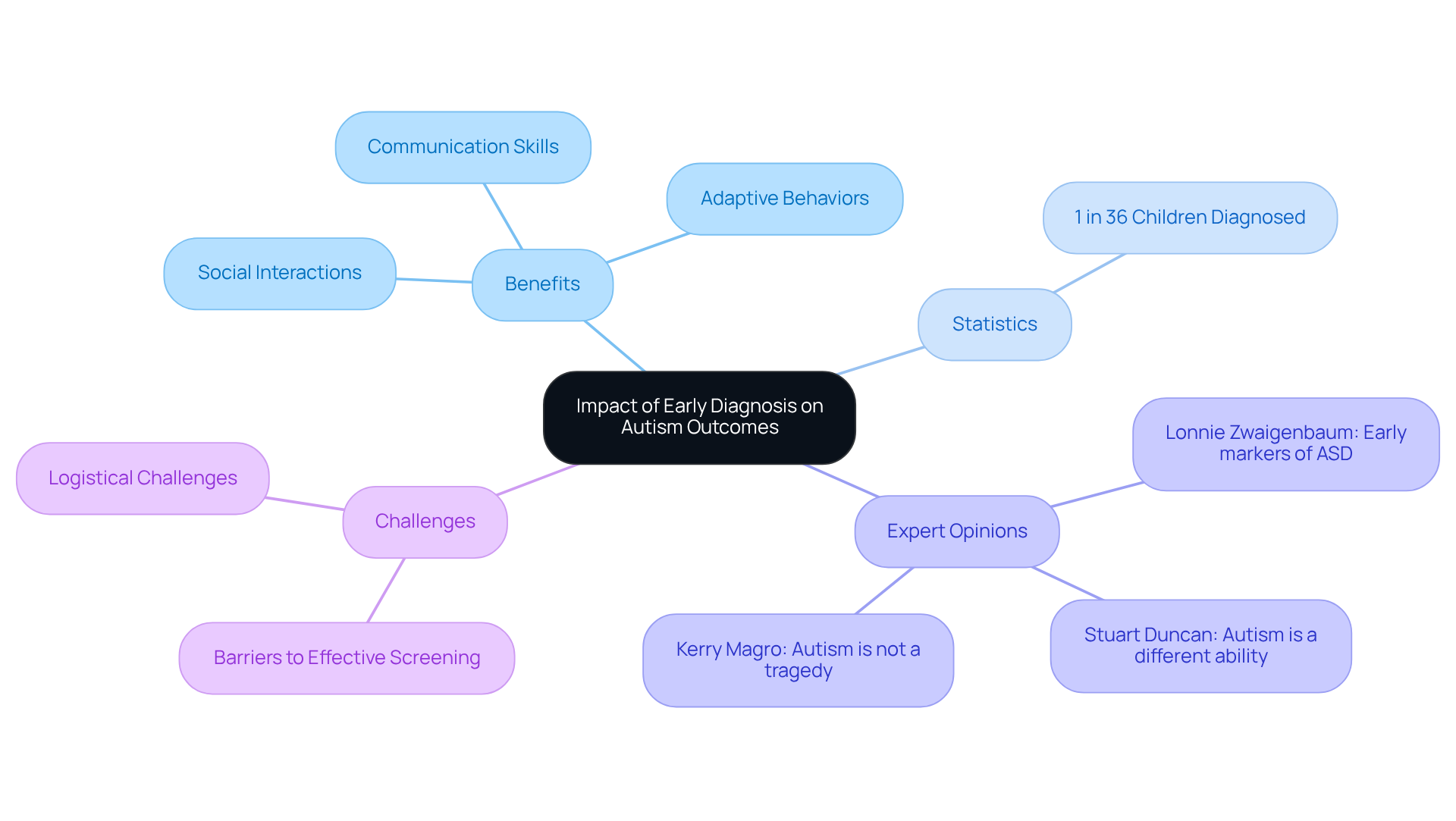
Customized Support Strategies for Children with Autism
Tailored support strategies for children with autism are essential for recognizing and nurturing each child’s unique strengths and challenges. Individualized plans often weave in behavioral interventions, communication aids, and sensory integration techniques, all crafted to meet specific needs. Collaboration among therapists, educators, and families plays a pivotal role in developing a comprehensive approach that fosters growth and learning. As Kelly Gabriel, director of Clinical Operations for Florida Autism Center, highlights, it is crucial for youth to carry the skills learned in therapy into their everyday lives.
Moreover, establishing regular routines can significantly reduce anxiety and help children feel more secure, paving the way for the acquisition of new skills and behaviors. For instance, young individuals receiving customized interventions have shown remarkable progress in communication and social skills, underscoring the effectiveness of these personalized approaches. By concentrating on their child's individual needs and actively participating in the support process, parents can unlock their child's potential and improve their overall quality of life, ensuring that the skills learned in therapy are practiced in daily settings.
Parents are encouraged to connect with support groups, sharing experiences and gathering valuable resources for crafting individualized plans. Every step taken together can make a profound difference in a child’s journey, fostering not only growth but also a sense of community and understanding.
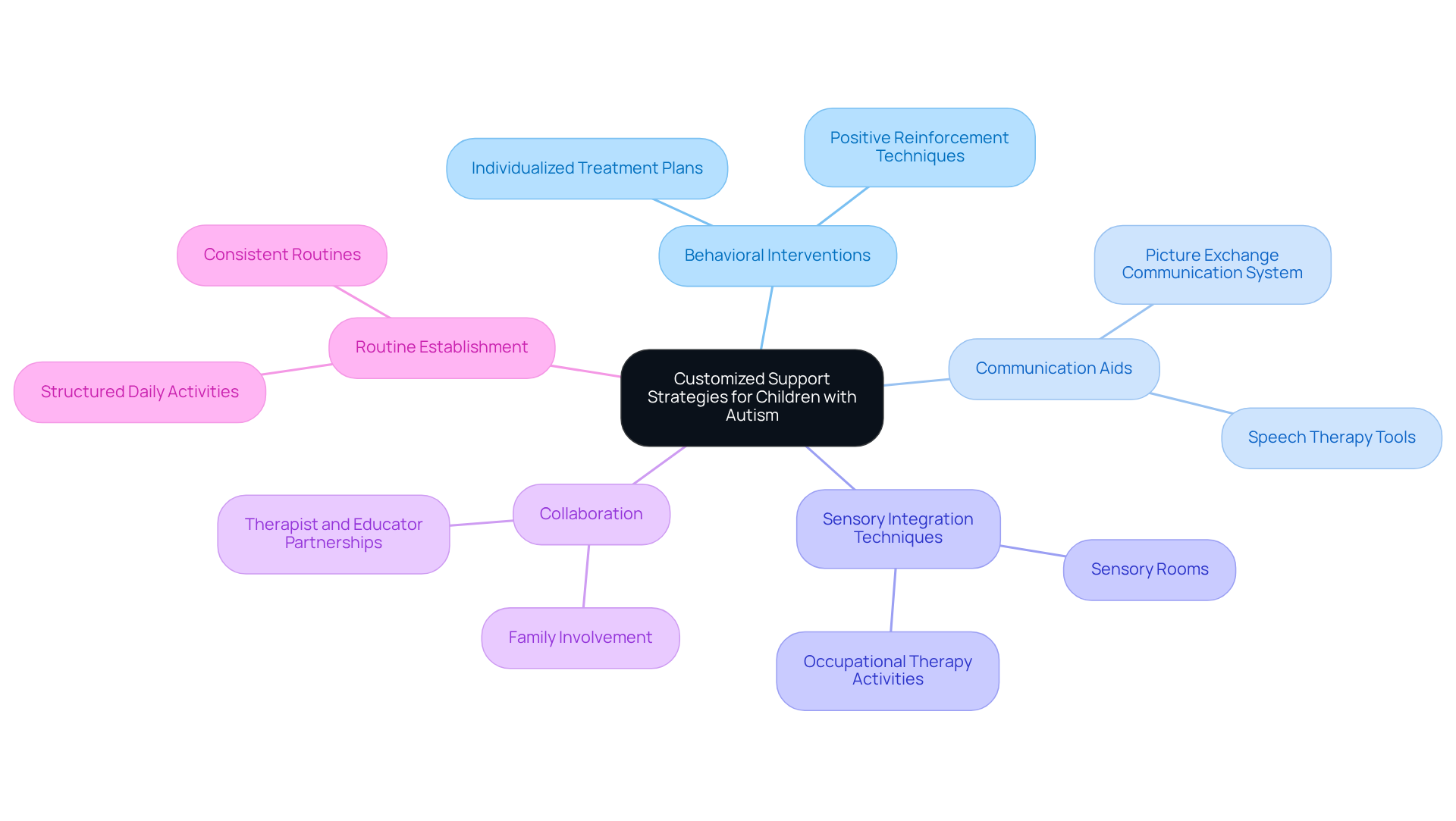
Conclusion
Understanding the significance of the 2-year-old autism test is crucial for parents aiming to support their child's developmental journey. This assessment serves as a vital tool for early identification of Autism Spectrum Disorder (ASD), enabling timely interventions that can dramatically enhance communication and social skills. Proactive engagement in the testing process empowers parents to secure the necessary resources and support for their children.
Key insights reveal the importance of early screening, the various assessments available, and the pivotal role healthcare professionals play in guiding families through this journey. By recognizing the signs of autism and understanding the implications of test results, parents can take informed steps towards effective interventions and personalized support strategies. Engaging with community resources, such as those offered by ASD Media, further enriches this experience, fostering a collaborative approach to care.
Ultimately, navigating the journey of autism testing and support requires both awareness and action. By prioritizing early detection and actively participating in the evaluation process, parents can significantly influence their child's long-term outcomes. Embracing this proactive stance not only benefits the individual child but also strengthens the community of families facing similar challenges, creating a supportive network that uplifts and empowers all involved.
Frequently Asked Questions
What is ASD Media and what do they offer?
ASD Media is dedicated to advancing Applied Behavior Analysis (ABA) therapy by providing insights and strategies for families facing challenges with developmental disorders. They offer a variety of resources for parents and specialists, aiming to create a supportive community for sharing experiences and receiving support.
How can families benefit from ASD Media's resources?
Families can access the latest news and digital resources by signing up for the newsletter, which empowers them to manage difficult behaviors, navigate support services, and enhance social skills development for children with developmental disorders and ADHD.
Why is early screening for autism important?
Early screening is essential for identifying developmental delays and behavioral issues, allowing for timely support. Research shows that children diagnosed with autism at a young age can benefit significantly from early intervention strategies that improve communication, social skills, and overall development.
What tools are used for early autism screening in 2-year-olds?
Common tools for screening include the Modified Checklist for Developmental Disorders in Toddlers, Revised (M-CHAT-R), the Screening Tool for Developmental Disorders in Two-Year-Olds (STAT), and the 2 year old autism test. These tools help assess a child's behavior and developmental status.
How does the M-CHAT-R work?
The M-CHAT-R is a parent-completed questionnaire designed to identify behaviors that may suggest a developmental disorder in toddlers.
What is the STAT and how does it differ from the M-CHAT-R?
The STAT engages toddlers through interactive activities to evaluate their communication and social skills, making it a play-based assessment that complements the M-CHAT-R.
What recent updates have been made to the M-CHAT-R?
Recent updates in 2025 have refined the M-CHAT-R to enhance its effectiveness as a reliable tool for early detection of developmental disorders.
What impact does early recognition of autism have on intervention outcomes?
Early recognition through tools like the M-CHAT-R and STAT can lead to prompt interventions, significantly improving long-term outcomes for children on the autism spectrum.
What should parents do if they have concerns about their child's development?
Parents are encouraged to have open conversations with their pediatrician about any concerns or inquiries regarding developmental assessments to ensure they have the necessary support and resources for their child's journey.




